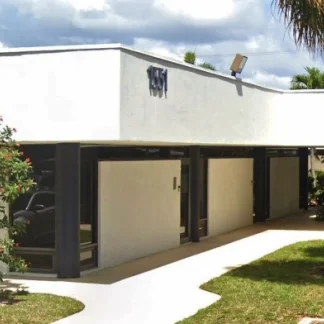Forrest Hill - Outpatient
Forrest Hill – Outpatient is a private rehab located in West Palm Beach, Florida...
London Treatment Center of Florida is a private organization located at West Palm, the facility provides substance abuse and mental health treatment. From Yoga to Surfing and even Boxing, London Treatment Center of Florida provides therapeutic activities, this can be an essential component of the healing process.
Contact us for more information: (561) 508-2336

Connect with London Treatment Center of Florida by calling their admissions team directly.
(561) 508-2336 Website Get DirectionsThe Joint Commission, formerly known as JCAHO, is a nonprofit organization that accredits rehab organizations and programs. Founded in 1951, the Joint Commision's mission is to improve the quality of patient care and demonstrating the quality of patient care.
Joint Commission Accreditation: Yes
Experiential therapy is a form of therapy in which clients are encouraged to surface and work through subconscious issues by engaging in real-time experiences. Experiential therapy departs from traditional talk therapy by involving the body, and having clients engage in activities, movements, and physical and emotional expression. This can involve role-play or using props (which can include other people). Experiential therapy can help people process trauma, memories, and emotion quickly, deeply, and in a lasting fashion, leading to substantial and impactful healing.
Research clearly demonstrates that recovery is far more successful and sustainable when loved ones like family members participate in rehab and substance abuse treatment. Genetic factors may be at play when it comes to drug and alcohol addiction, as well as mental health issues. Family dynamics often play a critical role in addiction triggers, and if properly educated, family members can be a strong source of support when it comes to rehabilitation. London Treatment Center of Florida strongly believes that family involvement is critical in the recovery process. The facility, therefore, established a family program for the purpose of assisting clients and their family members in better understanding the disease of addiction, as well as to provide an opportunity to address the many questions and concerns clients have about this powerful disease.
Group therapy is any therapeutic work that happens in a group (not one-on-one). There are a number of different group therapy modalities, including support groups, experiential therapy, psycho-education, and more. Group therapy involves treatment as well as processing interaction between group members.
In individual therapy, a patient meets one-on-one with a trained psychologist or counselor. Therapy is a pivotal part of effective substance abuse treatment, as it often covers root causes of addiction, including challenges faced by the patient in their social, family, and work/school life.
Research clearly demonstrates that recovery is far more successful and sustainable when loved ones like family members participate in rehab and substance abuse treatment. Genetic factors may be at play when it comes to drug and alcohol addiction, as well as mental health issues. Family dynamics often play a critical role in addiction triggers, and if properly educated, family members can be a strong source of support when it comes to rehabilitation. London Treatment Center of Florida strongly believes that family involvement is critical in the recovery process. The facility, therefore, established a family program for the purpose of assisting clients and their family members in better understanding the disease of addiction, as well as to provide an opportunity to address the many questions and concerns clients have about this powerful disease.
Group therapy is any therapeutic work that happens in a group (not one-on-one). There are a number of different group therapy modalities, including support groups, experiential therapy, psycho-education, and more. Group therapy involves treatment as well as processing interaction between group members.
In individual therapy, a patient meets one-on-one with a trained psychologist or counselor. Therapy is a pivotal part of effective substance abuse treatment, as it often covers root causes of addiction, including challenges faced by the patient in their social, family, and work/school life.
Group therapy is any therapeutic work that happens in a group (not one-on-one). There are a number of different group therapy modalities, including support groups, experiential therapy, psycho-education, and more. Group therapy involves treatment as well as processing interaction between group members.
In individual therapy, a patient meets one-on-one with a trained psychologist or counselor. Therapy is a pivotal part of effective substance abuse treatment, as it often covers root causes of addiction, including challenges faced by the patient in their social, family, and work/school life.
In individual therapy, a patient meets one-on-one with a trained psychologist or counselor. Therapy is a pivotal part of effective substance abuse treatment, as it often covers root causes of addiction, including challenges faced by the patient in their social, family, and work/school life.
Forrest Hill – Outpatient is a private rehab located in West Palm Beach, Florida...
Q Health offers hope, recovery and wellness to adolescents and adults in need of...
CDAO – Community Drug Abuse Organization is a private rehab located in West Palm...
Daylight Recovery Center combines mental health and substance abuse rehab has th...